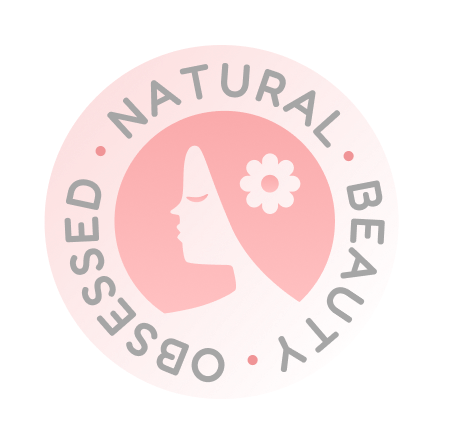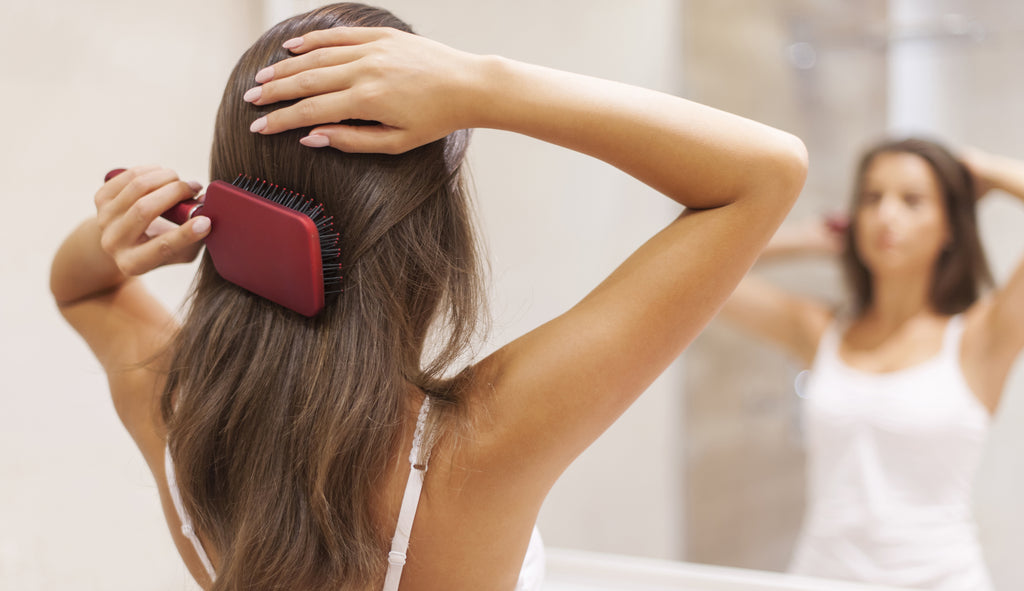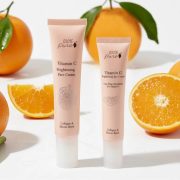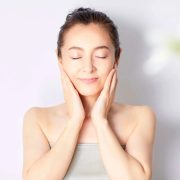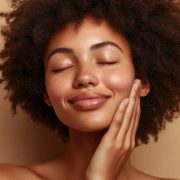We’ll tell you which bad habits to kick, and teach you tips for getting a healthy scalp and healthier head of hair!
Posted on January 3, 2025 Written by: 100% PURE®

For lustrous hair with healthy regrowth and strong roots, it’s important to trace hair care back to where it all begins: your scalp. Maintaining a healthy scalp is essential for keeping your mane happily nourished. Although it’s easy to neglect, scalp care (yes, like skin care) requires cleansing, exfoliating, and moisturizing.
Many of us are guilty of habits that cause brittle hair, irritated follicles, or an itchy scalp. Symptoms like flaking and irritation can all be traced back to how well your scalp is dealing with dead skin cells, producing adequate lipids, and getting enough circulation.
It’s time to ask yourself: do YOU have a healthy scalp?

Avoid These Bad Habits to Get Your Scalp Back on Track
First, make sure you’re not scalding your scalp with ultra-hot water or high heat settings on styling tools. When your scalp is exposed to extreme temperatures, its natural lipid barrier is disrupted, leading to either sebum overproduction (resulting in greasy hair and even breakouts on your scalp) or sebum depletion, meaning clinical dryness and flaking.
At-home hair coloring is another major offender for harming your scalp. Frequent use of at-home bleach kits, dying your roots yourself, or even using natural citrus based products for sun activated highlights can also be a scalp health red flag. Hair cuticles are stripped in the process of bleaching, and if the chemical is applied for too long, or too close to the scalp, you can produce mild chemical burns which prevent healthy growth. Professional hair stylists use protective products and conditioners to prevent this kind of damage, so do your scalp a favor and leave coloring to the professionals.
For most hair types, using clarifying shampoos more than two or three times a week isn’t necessary, and might be the culprit behind your frizz. Particularly damaging are conventional drugstore shampoos, which are filled with sulfates and chemical laden foaming agents. Frequent use of these types of products can strip your scalp of its natural oils, creating brittle hair and fluctuations in oil production (either too much or not enough). Instead, switch to and for a gentle, plant-based cleanse that nourishes your scalp while balancing oil production.
Don’t neglect your brushing and combing habits! Yanking and tugging with your brush can damage hair follicles permanently, and using a dirty brush or comb can distribute bacteria to your scalp, causing irritation or hairline blemishes.

Here’s What You Should Be Doing for a Healthy Scalp
A few proper, everyday habits will keep your follicles strong and your scalp balanced. When it comes to combing and brushing, be gentle and make sure you brush from the roots to the ends to stimulate hair growth, and distribute nutrients and product.
1. Massage Your Scalp
Weekly scalp massages stimulate circulation, improve nutrient delivery, and reduce symptoms of an itchy scalp. Use the during your massage to enhance the process. This lightweight serum contains rosemary and peppermint oils, which promote healthier follicles and help soothe irritated, flaky scalps.
If you’re a curly girl or have particularly coarse hair (or mature, grey or white hair), chances are your scalp is slightly more prone to dryness. If this is the case, opt for a weekly scalp oil or moisturizing treatment, which will help your hair produce keratin (its primary protein). Antibacterial oils like coconut oil are also excellent for massaging directly into your scalp, to reduce inflammation and flaking (jojoba and almond are great, too).
Stick with plant-based, hair loving ingredients in your conditioner, like flaxseed oil, hemp oil and , and make sure you’re not just conditioning your ends — work the product into your scalp as well! A scalp conditioning routine will enhance your scalp’s lipid balance, and allow your follicles to absorb H2O for super bouncy and hydrated hair. Peep our for a breakdown that’s tailored to different hair types!
2. Exfoliate Regularly
As we do with our skin, it’s important to consider the role of exfoliation — only this time, in regards to healthy hair growth. When pores on your scalp suffer from a buildup of dead skin cells and accumulated hair product, they effectively block new hair growth and contribute to thinning hair. This means that gentle mechanical exfoliation is ultra important, to increase skin cell turnover and slough off buildup. Exfoliating helps increase oxygen flow and prepares your scalp for better absorption of treatments like the and . These products are packed with vitamins that nourish your scalp and improve hair strength, leaving your hair shinier and more resilient.
Exfoliating is also an essential method for bringing oxygen and protein to the scalp, and preparing it for maximum absorption of any hair treatments you apply. The experts have weighed in, and scalp exfoliation is key — and we’ve created a handy guide for giving you the .
3. Condition Your Scalp
When conditioning, don’t stop at your ends! Work your conditioner into your scalp to restore hydration and balance lipids. Conditioning your scalp can prevent dryness and reduce the likelihood of developing an itchy scalp.
4. Use Plant-Based Products
Natural ingredients like neem, burdock root, and rosemary can help balance your scalp’s oil production and reduce irritation. Avoid harsh chemical shampoos and opt for natural alternatives that nourish your scalp without stripping it of essential oils.
The Link Between Scalp Health and Hair Growth
Did you know that a healthy scalp directly impacts your hair growth? If your scalp isn’t properly cared for, you may notice slower hair growth, increased shedding, and even thinning hair. This is because hair follicles rely on a healthy scalp environment to grow strong and healthy hair strands.
An itchy scalp can be a sign of inflammation or buildup, both of which can impede hair growth. That’s why using the right products and techniques is essential. Scalp exfoliation, regular hydration, and the use of plant-based ingredients can keep your scalp balanced and create the perfect foundation for healthier, thicker hair.
Incorporate products like the into your routine to stimulate hair follicles and improve circulation. With the right care, you’ll notice fewer signs of scalp irritation and more vibrant hair growth.
Remember, we all have , and our scalps are reflective of that. Some of us might hail from the land of dandruff, while others might suffer from the four o’clock grease shadow. But with the right , a healthy scalp and shiny locks are easy to achieve! Just remember: healthy hair starts with a healthy scalp!
So which natural ingredients should YOU be looking for in your shampoo and conditioner? Peep our for answers. Keep up with us here for more
FAQs About Achieving a Healthy Scalp
1. What causes an itchy scalp, and how can I fix it?
An itchy scalp can be caused by several factors, including dryness, product buildup, or scalp infections. To fix it, use a gentle, hydrating shampoo like Burdock and Neem Healthy Scalp Shampoo and exfoliate regularly to remove buildup. Scalp massages with oils like rosemary or peppermint can also help reduce irritation.
2. How often should I wash my hair to maintain a healthy scalp?
It depends on your hair type and lifestyle. For most people, washing 2-3 times a week with a nourishing shampoo like the Multi-Vitamin Healthy Hair Shampoo is ideal. Overwashing can strip your scalp of natural oils, while infrequent washing can lead to buildup and an itchy scalp.
3. Can I use conditioner on my scalp?
Yes! In fact, conditioning your scalp can help restore moisture and prevent dryness. Use a lightweight, natural conditioner like Burdock and Neem Healthy Scalp Conditioner to keep your scalp hydrated without weighing down your hair.
4. How can I exfoliate my scalp at home?
You can exfoliate your scalp by using a scalp scrub or a soft-bristled brush to gently massage your scalp in circular motions. Products like the Rosemary Grow Serum can be massaged into the scalp to help remove buildup and improve circulation.
5. Can scalp health affect hair growth?
Absolutely. A healthy scalp is essential for strong hair growth. An itchy scalp or one with buildup can block hair follicles, slowing hair growth and increasing shedding. Regular scalp care, including hydration, exfoliation, and the use of plant-based products, can help create a healthy environment for hair to thrive.
